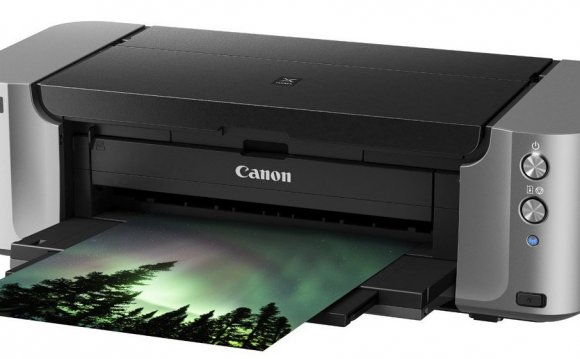
The Canon Pixma PRO-100 could be the brand new junior design in Canon's expert photo inkjet line, but therefore it may nevertheless output gallery-quality images at sizes around 13 by 19 inches. It is a good choice for an amateur photographer who's trying to take the hobby more seriously.
At 8.6 by 27.2 by 15.2 inches (HWD) when closed, it's slightly bigger than its Epson equivalent, the Editors' solution Epson Stylus Photo R2000, and about the same body weight. Like R2000, it lacks an LCD; instructions and information like ink container levels are shown in the display for the computer you're printing from. It includes WiFi and Ethernet as well as USB connectivity.
The PRO-100 utilizes eight ink tanks because of its dye-based inks: black; grey; light gray; yellow; magenta; picture magenta; cyan; and photo cyan. The high-end model in show, the Canon Pixma PRO-1, sports 12 ink tanks. Even though the PRO-100's sticker price is a lot significantly less than compared to the PRO-1, its ink costsat the very least in cost per milliliter of ink, as there isn't any simple method determine the cost per imprinted page because of this kind of printerare significantly greater. Every one of its tanks holds 13 ml of ink, at a price of $1.31 per ml, compared with an even dollar per ml for the PRO-1, which includes higher ability (36 ml) tanks. The PRO-100's ink prices per ml may a little greater than the $1.25 per ml of this Editors' possibility Epson Stylus Photo R2000.
The PIXMA PRO-100 features two paper trays: a rear tray for many different artwork and glossy photo papers, and a handbook slot for thicker media. In addition it allows printing onto printable CDs, DVDs, and Blu-ray disks.
Speed
Speed takes a back seat to quality with near-dedicated photo printers, but faster continues to be better, all else being equal. We timed the Canon Pixma PRO-100 (using QualityLogic's equipment and software) at on average 1 minute 17 seconds to output a 4-by-6 printing and 2:01 to output an 8-by-10. This might be a little slower versus 51 moments per 4-by-6 and 1:42 per 8-by-10 for the Epson R2000, but faster compared to the Canon Pixma PRO-1's 2:14 and 3:53 times.
Output High Quality
No one purchases a photo printer like PRO-100 to printing text, but it's advisable that you know it may achieve this if you need it to, whilst features above-average high quality for an inkjet. It performed specifically well on many of the more common business fonts. Graphics quality was somewhat above par for an inkjet, though colors had been off on a few pictures.
It is with photographs, however, that the PRO-100 actually shines. Within standard image examinations, it did very well in getting detail in both light and dark places, as well as in faces. There is the barest hint of a tint in a monochrome image, but only a perfectionist probably will notice. I also did some ad-hoc examination, including with larger-format (13 by 19 ins) prints. It don't do rather along with the PRO-1 in printing pictures with very dark backgrounds, which isn't astonishing as five of that printer's 12 ink tanks tend to be numerous tones of black colored or gray. In a couple of prints, the colors had been a little off. Nevertheless, the overall picture high quality is good enough to produce images for convention or purchase.
The Canon Pixma PRO-1 expenses double the amount as PRO-100 and is larger, heavier, and slowly, but has dramatically reduced ink costs. The PRO-1 performed a superior work of printing pictures with black colored or extremely dark backgrounds, and performed a little much better in printing other photos too.
The Epson Stylus picture R3000 ($849.99 direct), which prints top-tier photographs and graphics, adds a shade LCD in addition to power to print from report rolls.
The Epson R2000 is an impression smaller than the PRO-100 and contains a slight advantage in speed, and somewhat reduced ink costs (per volume at the very least). Having said that, they both create gallery-worthy prints, and selecting between them may come right down to whether you want the appearance of Epson or Canon prints, that have slightly different characteristics. They both offer WiFi, Ethernet, and USB connectivity.









